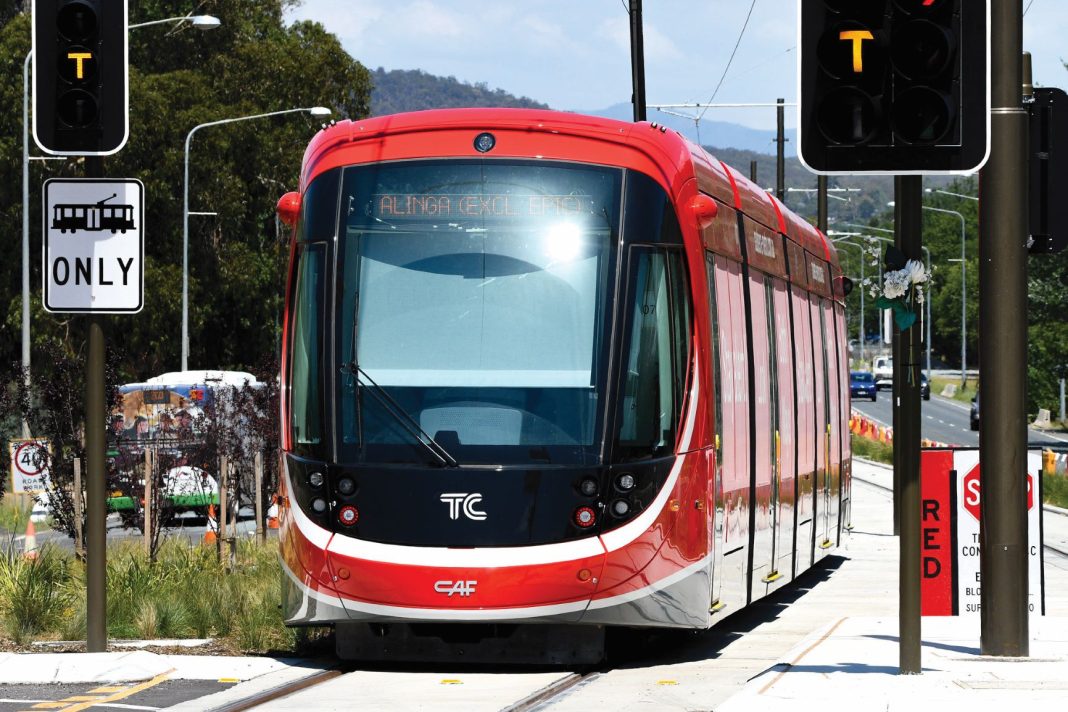Five years ago today, at Easter 2019, light rail began running from Gungahlin to Civic.
In that time, 16.5 million passenger trips have been made along the 12 km track, accounting for 20 per cent of all public transport patronage; the tram has travelled more than 4.5 million kilometres travelled; and 99.98 per cent of services run on time.
“Our first mass-transit system, through the delivery of Stage 1 of Light Rail, represented a vision for Canberra as a connected and vibrant city,” an ACT Government spokesperson said.
“Canberra has now experienced what it means to have a mass-transit system in Light Rail, and the benefits are clear.”
As Canberra’s population grows to 620,000 by 2046, car dependency is unsustainable, the ACT Government argues. With 400,000 more car trips being made, the roads would be congested, noisy, and travel slow. Smart, environmentally-friendly public transport is their solution.
Ryan Hemsley, Chair of the Public Transport Association of Canberra, said the usage figures “vindicate the ACT Government’s bold decision to invest in a light rail mass transit system for Canberra. The patronage statistics in particular are a strong argument for continued expansion of light rail to Woden and other parts of our nation’s capital.”
Stage 2A will connect Civic to Commonwealth Park, and stage 2B Commonwealth Park to Woden. Construction on stage 2A will begin in 2024, and start running in 2028, the government says. Stage 2B will not begin running until 2033 – 14 years after Stage 1.
“With construction now well underway on the raising London Circuit project, Canberrans can expect early works occurring for the next stage to Commonwealth Park,” a government spokesperson said.
“The ACT Government is committed to delivering a modern integrated transport network, that is a north-south light rail spine, supported by an electric bus fleet.”
PTCBR called on the government to build on the success of light rail, and invest in additional services on Fridays and weekends, and to run buses more frequently on weekends “to provide Canberrans with a convenient, reliable and integrated seven-day public transport network”.
But light rail has been controversial, many arguing that the government’s claims and cost projections do not stack up. The Auditor-General, for instance, told the government to review their business care and economic analysis (they refused); while a report published earlier this year argued that stage 2B not proceed because it would be slow, expensive, inflexible, damage the environment, and impose a financial burden on Canberrans for generations.
The Canberra Liberals calculate that light rail will be slower than buses, and cost $5 billion – which the ACT cannot afford; Canberrans will have to pay higher taxes, and money has been taken away from areas, they say. The government allegedly sold public housing stock to finance light rail, and reallocated nearly $86 million from road infrastructure to light rail. Should they win in October, the Liberals will honour the contract for 2A, but go no further, stopping at Commonwealth Park; electric buses, which they argue are fast, affordable, and flexible, are their favoured mode of transport.
The ACT Greens, meanwhile, are concerned that ACT Labor is dragging its feet; light rail, they announced today, can and must be built faster.
“The Greens are so pleased to celebrate what an overwhelming success light rail has been in Canberra over the past five years,” Jo Clay, ACT Greens spokeswoman for transport, said. “Now Canberrans want us to get on with extending the line.
“ACT Labor say they can’t deliver Light Rail to Woden before 2033, but the Greens won’t just sit back and accept that.
“Other cities, like the Gold Coast, have shown it’s possible to deliver light rail faster. We all face the same labour and supply challenges, and we are all operating in the same national infrastructure market.
“The Greens envisage a light rail network, not just a shuttle line. If we want our kids to be able to use it throughout their life, we need continual construction.
“Let’s start building Commonwealth Park to Woden during the construction, testing and commissioning of Stage 2A. There’s no reason we need to wait until 2028 or later to start building Stage 2B.
“Stop-start works and a lack of priority given to this project by Labor is delaying major improvements in the way locals and visitors experience this city.
“Transport accounts for a huge chunk of the ACT’s emissions, and giving more people the option to take light rail is one key way to help reduce this.”
The all-renewable electric light rail is expected to lower transport emissions (more than 60 per cent of ACT greenhouse gas).
“Canberrans love the high-quality, zero-emissions transport they’ve experienced over the past five years on light rail to Gungahlin,” Ms Clay said. “We can’t and won’t wait to share the love of light rail with Canberra’s south.”
But how much do the ACT Greens envisage light rail would cost? Can they provide light rail cheaper than Labor?
“We don’t need the discussion about public transport policy to be a race to the bottom, where the discussion is focused on chasing the cheapest option,” Ms Clay said. “That discussion isn’t about how you deliver a genuinely improved service, it’s about how you cut costs.
“We need to change how we think about public transport, it should be an option that everyone wants to use, rather than being seen as an afterthought or something we seek to cut costs on.
“That’s why we need to significantly improve public transport across Canberra with more frequent and reliable buses and an expanded light rail network connecting more parts of the city with more certainty, delivered much faster than Labor’s current plan, and much better footpaths and bike paths.
“Less than 4 per cent of ACT journeys are made by public transport, and that needs to improve dramatically. Buses alone won’t improve the public transport service enough, we need a great bus and light rail system city-wide, and that requires significant long-term investment.”



